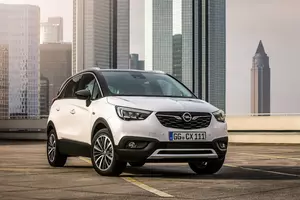
| Vehicle | Curb weight | Difference from world's smallest | Weight to power ratio | 0—60 mph acceleration ratio | Consumption ratio |
|---|---|---|---|---|---|
| 1.2 ECOTEC Turbo |
1214 kg / 2677 lbs |
789 kg (1740 lbs) heavier | 11 kg to 1 hp | 108 kg/s (238 lbs/s) |
229 kg/L (505 lbs/L) |
| 1.6 |
1244 kg / 2743 lbs |
819 kg (1806 lbs) heavier | 10 kg to 1 hp | 132 kg/s (291 lbs/s) |
311 kg/L (686 lbs/L) |
| 1.2 Turbo |
1291 kg / 2847 lbs |
866 kg (1910 lbs) heavier | 10 kg to 1 hp | 133 kg/s (293 lbs/s) | - |
| 1.2 |
1099 kg / 2423 lbs |
674 kg (1486 lbs) heavier | 13 kg to 1 hp | 80 kg/s (176 lbs/s) |
215 kg/L (474 lbs/L) |
| 1.6 ECOTEC |
1214 kg / 2677 lbs |
789 kg (1740 lbs) heavier | 12 kg to 1 hp | 106 kg/s (234 lbs/s) |
368 kg/L (811 lbs/L) |
| 1.5d |
1214 kg / 2677 lbs |
789 kg (1740 lbs) heavier | 12 kg to 1 hp | 109 kg/s (240 lbs/s) |
304 kg/L (670 lbs/L) |
| Vehicle | 1.2 ECOTEC Turbo |
|---|---|
| Curb weight |
1214 kg / 2677 lbs |
| Difference from world's smallest | 789 kg (789 lbs) heavier |
| Weight to power ratio | 11 kg to 1 hp |
| 0—60 mph acceleration ratio | 108 kg/s (238 lbs/s) |
| Consumption ratio |
229 kg/L (505 lbs/L) |
| Vehicle | 1.6 |
| Curb weight |
1244 kg / 2743 lbs |
| Difference from world's smallest | 819 kg (819 lbs) heavier |
| Weight to power ratio | 10 kg to 1 hp |
| 0—60 mph acceleration ratio | 132 kg/s (291 lbs/s) |
| Consumption ratio |
311 kg/L (686 lbs/L) |
| Vehicle | 1.2 Turbo |
| Curb weight |
1291 kg / 2847 lbs |
| Difference from world's smallest | 866 kg (866 lbs) heavier |
| Weight to power ratio | 10 kg to 1 hp |
| 0—60 mph acceleration ratio | 133 kg/s (293 lbs/s) |
| Consumption ratio | - |
| Vehicle | 1.2 |
| Curb weight |
1099 kg / 2423 lbs |
| Difference from world's smallest | 674 kg (674 lbs) heavier |
| Weight to power ratio | 13 kg to 1 hp |
| 0—60 mph acceleration ratio | 80 kg/s (176 lbs/s) |
| Consumption ratio |
215 kg/L (474 lbs/L) |
| Vehicle | 1.6 ECOTEC |
| Curb weight |
1214 kg / 2677 lbs |
| Difference from world's smallest | 789 kg (789 lbs) heavier |
| Weight to power ratio | 12 kg to 1 hp |
| 0—60 mph acceleration ratio | 106 kg/s (234 lbs/s) |
| Consumption ratio |
368 kg/L (811 lbs/L) |
| Vehicle | 1.5d |
| Curb weight |
1214 kg / 2677 lbs |
| Difference from world's smallest | 789 kg (789 lbs) heavier |
| Weight to power ratio | 12 kg to 1 hp |
| 0—60 mph acceleration ratio | 109 kg/s (240 lbs/s) |
| Consumption ratio |
304 kg/L (670 lbs/L) |